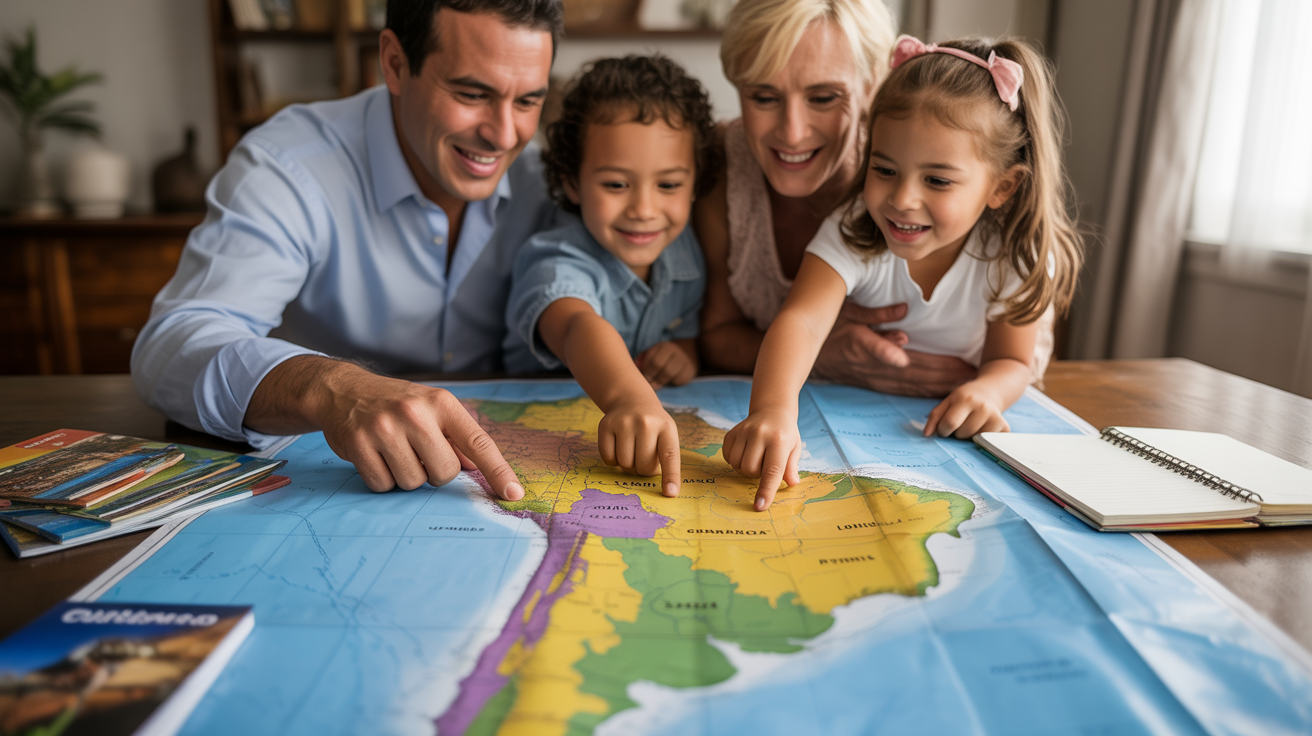When our family decided where our son would be born, it wasn’t a vacation decision. It was strategic.
We wanted a country aligned with our values — one that would give our children something enduring: options. Not just another passport, but a future not tied to the political whims or visa policies of a single nation.
After months of research, we chose Brazil — not randomly, but through a deliberate, values-based process that balanced lifestyle, law, and legacy.
We Started With Two Non-Negotiables: Weather and Time Zones
Being from Seattle, we were afraid of too much heat. We wanted cooler temperatures, fresh air, and a rhythm that matched the slower pace of early parenthood.
We also needed a Western Hemisphere time zone — aligned with U.S. and Canadian working hours — so we could manage business, stay connected with clients and partners, and maintain family relationships back home without predawn calls or fractured sleep schedules.
Those two requirements pointed us south — far enough south to escape equatorial heat while staying in a workable time zone.
That left us with three viable options: Chile, Brazil, and Argentina.
All three offered temperate climates in their southern regions. All three sat in time zones compatible with North American business hours. All three were respected, regionally influential countries.
But the similarities ended there.
Why We Eliminated Chile
Chile had been a popular choice for birth tourism and family residency — until 2024, when the government tightened its nationality laws.
Under the new rules, siblings of a Chilean-born child can no longer receive immediate residency. They must wait until the child turns 14 years old.
That made Chile unworkable for us. We weren’t waiting fourteen years for siblings to belong. We wanted inclusion from day one — for the entire family, not just the parents.
Chile was off the list.
Why We Eliminated Argentina
Argentina initially looked promising — beautiful cities like Buenos Aires and Mendoza, strong cultural identity, solid regional influence.
But two critical issues disqualified it.
1. You Can’t Renounce Argentine Citizenship
Argentine citizenship is constitutionally permanent. Once you have it — whether by birth or naturalization — it’s yours for life. Even if you acquire another nationality or formally declare renunciation, Argentina will still consider you a citizen.
We wanted a country that respected both belonging and autonomy — where citizenship is a choice, not a life sentence. Argentina’s forced permanence didn’t align with our values around freedom.
2. Only Citizens by Birth Can Pass Citizenship by Descent
In Argentina, if you naturalize and then have a child abroad, that child isn’t automatically Argentine. They’d have to apply for residency or naturalization later.
Our goal wasn’t just creating opportunity for ourselves — it was extending it to future generations.
We wanted a passport that could pass through bloodlines indefinitely, building sovereignty across generations without restarting the process each time.
Argentina’s limitation broke that chain.
Argentina was off the list.
Why Brazil Was the Clear Choice
That left Brazil — and the more we examined it, the more it stood out as the only option that aligned with everything we valued.
The Climate Worked
Southern Brazil delivered exactly what we needed. Cities like Florianópolis, Curitiba, and Porto Alegre offer temperate weather, modern infrastructure, and a culture that feels both familiar and distinctly Latin.
The Time Zone Worked
Brazil operates in a Western time zone, keeping us aligned with North American rhythms without sacrificing business connectivity or family communication.
Immediate Family Inclusion
Under Brazilian nationality law, when a child is born on Brazilian soil, their parents and siblings automatically qualify for permanent residency. Parents can then apply for naturalization after just one year.
Everyone belongs from day one.
No waiting periods.
No bureaucratic limbo for siblings.
True Freedom to Choose
In Brazil, citizenship is voluntary. You can renounce it if you choose — no penalties, no permanent entanglements, no forced allegiance.
Brazilian law treats citizenship as an invitation, not a cage. You can accept it, use it, or release it entirely — and the government honors your decision.
That’s not a small legal detail.
It’s a reflection of the country’s philosophy of freedom.
Generational Continuity
Brazil recognizes both jus soli (right of the soil) and jus sanguinis (right of blood).
Our son’s Brazilian citizenship by birth won’t end with him. His children — and their children — will inherit that same right, even if born elsewhere.
And unlike Argentina, Brazil doesn’t distinguish between citizens by birth and citizens by naturalization when it comes to passing citizenship forward.
Once you’re a citizen — by any legal path — your descendants qualify, no matter where they’re born.
It’s a structure designed to preserve connection across generations, not limit it.
Strategic Independence
We also weren’t looking for U.S. visa-free access.
This might sound counterintuitive to most second citizenship seekers, but for us it was intentional.
Countries with limited U.S. access tend to maintain independent foreign policies — they don’t automatically align with American interests.
We didn’t want another passport mirroring our existing alliances. We wanted diversification, not duplication.
Brazil fits that balance perfectly — a respected, regionally powerful country with its own identity and global influence.
The Bigger Picture: Sovereignty by Design
Our choice wasn’t about chasing lifestyle or status.
It was about building sovereignty into our family’s DNA.
We started with two practical requirements — cooler weather and compatible time zones — which narrowed our options to three countries in South America’s southern cone.
-
Chile failed because it excludes siblings for 14 years.
-
Argentina failed because it traps you in permanent citizenship and breaks generational continuity for naturalized citizens.
-
Brazil succeeded because it respected autonomy, included the entire family immediately, and created a true multi-generational framework for freedom.
Sometimes freedom doesn’t look like a new destination.
It looks like a carefully chosen foundation — one built on the laws, values, and possibilities of a place that sees family the way we do: as something to empower, not restrict.

